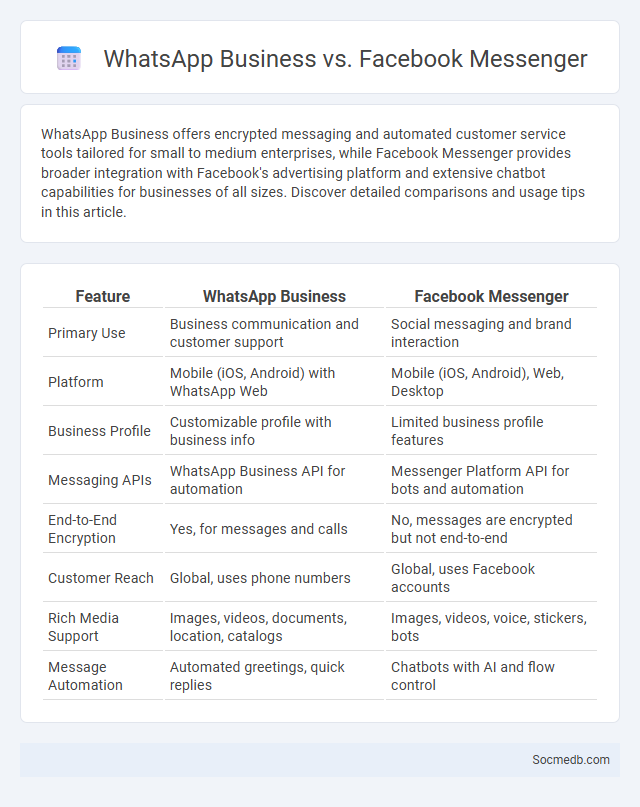
Photo illustration: WhatsApp Business vs Facebook Messenger
WhatsApp Business offers encrypted messaging and automated customer service tools tailored for small to medium enterprises, while Facebook Messenger provides broader integration with Facebook's advertising platform and extensive chatbot capabilities for businesses of all sizes. Discover detailed comparisons and usage tips in this article.
Table of Comparison
| Feature | WhatsApp Business | Facebook Messenger |
|---|---|---|
| Primary Use | Business communication and customer support | Social messaging and brand interaction |
| Platform | Mobile (iOS, Android) with WhatsApp Web | Mobile (iOS, Android), Web, Desktop |
| Business Profile | Customizable profile with business info | Limited business profile features |
| Messaging APIs | WhatsApp Business API for automation | Messenger Platform API for bots and automation |
| End-to-End Encryption | Yes, for messages and calls | No, messages are encrypted but not end-to-end |
| Customer Reach | Global, uses phone numbers | Global, uses Facebook accounts |
| Rich Media Support | Images, videos, documents, location, catalogs | Images, videos, voice, stickers, bots |
| Message Automation | Automated greetings, quick replies | Chatbots with AI and flow control |
Introduction to Business Messaging Platforms
Business messaging platforms streamline communication by integrating multiple social channels like WhatsApp, Facebook Messenger, and SMS into a single interface. These tools enhance customer engagement through real-time responses and personalized interactions, boosting brand loyalty and sales conversions. You benefit from improved efficiency and consistent messaging, enabling your business to manage inquiries and support seamlessly across various platforms.
Overview of WhatsApp Business
WhatsApp Business is a communication platform designed for small and medium-sized enterprises to connect with customers through direct messaging, enabling real-time support and marketing. It offers features such as automated responses, business profiles with essential information, and integration with Facebook and Instagram for unified social media management. By leveraging WhatsApp Business, companies can enhance customer engagement, streamline inquiries, and boost sales through personalized interaction.
Key Features of Facebook Messenger for Business
Facebook Messenger for Business offers a seamless customer communication platform integrating chatbots for automated responses, personalized customer support, and real-time messaging. It supports multimedia sharing, appointment booking, and payment processing within the app, enhancing user engagement and streamlining transactions. Advanced analytics and integration with Facebook Shops enable businesses to track performance and optimize marketing strategies effectively.
What is a Business Account on Messaging Platforms?
A business account on messaging platforms is a specialized profile designed for companies to interact with customers efficiently and professionally. It offers features such as automated responses, detailed analytics, and product catalogs to enhance customer engagement and streamline communication. By using a business account, you can improve your brand's visibility and provide personalized support directly within popular messaging apps.
User Base and Reach Comparison
Social media platforms vary significantly in user base size and reach, with Facebook boasting over 2.9 billion monthly active users, making it the largest global network, while Instagram attracts more than 2 billion users with a strong focus on visual content. TikTok's rapid growth has surpassed 1 billion active users, particularly popular among younger demographics, enhancing Your ability to target specific audiences. Twitter, with approximately 450 million active users, offers real-time engagement and reaches niche communities, contrasting with LinkedIn's 900 million professionals specializing in B2B connections and industry networking.
Integration and Automation Capabilities
Social media platforms offer powerful integration and automation capabilities that streamline content management and enhance engagement across multiple channels. Utilizing APIs and third-party tools, you can automate scheduling, monitor audience interactions, and analyze performance metrics in real time. These advanced features enable your marketing strategy to be more efficient, data-driven, and responsive to trends.
Security and Privacy Differences
Social media platforms vary significantly in their security and privacy features, with some offering end-to-end encryption and robust data protection policies while others collect extensive user data for targeted advertising. Your personal information's safety depends on the platform's policies, encryption standards, and settings you choose, such as two-factor authentication and privacy controls. Understanding these differences helps you manage risks and protect your digital identity effectively.
Cost and Monetization Options
Social media platforms offer diverse monetization options including advertising revenue, sponsored content, affiliate marketing, and subscription models, enabling users and businesses to generate income efficiently. The cost of running social media campaigns varies widely, influenced by factors such as platform choice, target audience size, and ad format, with expenses ranging from minimal boosts to substantial investments in targeted ads. Effective cost management and strategic monetization are critical for maximizing returns and achieving sustainable growth on social media channels.
Ideal Use Cases for Each Platform
Instagram excels in visual storytelling, making it ideal for brands in fashion, food, and travel to showcase high-quality images and short videos that engage audiences. LinkedIn serves as the premier platform for B2B marketing, professional networking, and sharing industry insights, helping companies reach decision-makers and build brand authority. Twitter's strength lies in real-time communication and trending topics, perfect for news updates, customer service, and engaging with communities through concise messages.
Choosing the Right Business Messaging Solution
Selecting the right business messaging solution enhances your customer engagement by providing efficient, real-time communication channels. Prioritize platforms that integrate seamlessly with your existing CRM systems and support various formats such as text, images, and video to maximize reach and interaction. Your choice should ensure scalability, security features, and analytics tools to measure message impact effectively.
 socmedb.com
socmedb.com